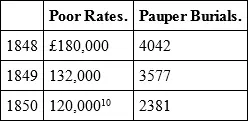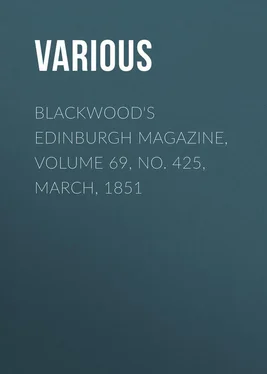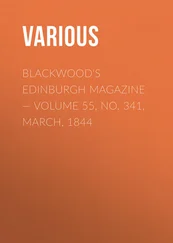Various - Blackwood's Edinburgh Magazine, Volume 69, No. 425, March, 1851
Здесь есть возможность читать онлайн «Various - Blackwood's Edinburgh Magazine, Volume 69, No. 425, March, 1851» — ознакомительный отрывок электронной книги совершенно бесплатно, а после прочтения отрывка купить полную версию. В некоторых случаях можно слушать аудио, скачать через торрент в формате fb2 и присутствует краткое содержание. Издательство: Иностранный паблик, Жанр: periodic, foreign_edu, Путешествия и география, на английском языке. Описание произведения, (предисловие) а так же отзывы посетителей доступны на портале библиотеки ЛибКат.
- Название:Blackwood's Edinburgh Magazine, Volume 69, No. 425, March, 1851
- Автор:
- Издательство:Иностранный паблик
- Жанр:
- Год:неизвестен
- ISBN:нет данных
- Рейтинг книги:3 / 5. Голосов: 1
-
Избранное:Добавить в избранное
- Отзывы:
-
Ваша оценка:
- 60
- 1
- 2
- 3
- 4
- 5
Blackwood's Edinburgh Magazine, Volume 69, No. 425, March, 1851: краткое содержание, описание и аннотация
Предлагаем к чтению аннотацию, описание, краткое содержание или предисловие (зависит от того, что написал сам автор книги «Blackwood's Edinburgh Magazine, Volume 69, No. 425, March, 1851»). Если вы не нашли необходимую информацию о книге — напишите в комментариях, мы постараемся отыскать её.
Blackwood's Edinburgh Magazine, Volume 69, No. 425, March, 1851 — читать онлайн ознакомительный отрывок
Ниже представлен текст книги, разбитый по страницам. Система сохранения места последней прочитанной страницы, позволяет с удобством читать онлайн бесплатно книгу «Blackwood's Edinburgh Magazine, Volume 69, No. 425, March, 1851», без необходимости каждый раз заново искать на чём Вы остановились. Поставьте закладку, и сможете в любой момент перейти на страницу, на которой закончили чтение.
Интервал:
Закладка:
Again he says —
"During the first ten of the last thirty years – that is, from 1821 to 1831 – the population increased at the rate of about 5000 a-year. During the second ten of these years – that is, from 1831 to 1841 – it increased at the rate of 8000 a-year. During the third ten of these years – that is, from 1841 to 1851 – it is believed, on good grounds, that the increase will average 12,000 a-year. Let any man consider these facts, and then, if he has courage to look forward at all, let him try to picture to himself the state of Glasgow when another thirty years shall have run their course . If the same ratio of increase holds on – and I know of no good reason for doubting that it will – we shall have in thirty years a population nearly equal in numbers to that of Paris; and most assuredly, if the Christian churches do not speedily arouse themselves, it will be by that time like Paris in more respects than one. We may have the numbers of the French capital, but we shall have their infidelity, their Popery, their licentiousness, and their lawlessness too . If our efforts did not keep pace with a population growing at the rate of 5000 a-year, how are such efforts to do alongside of a population growing at the rate of from 12,000 to 15,000 a-year? If in the race of the last thirty years we fell at least twenty years behind, how tremendously and how ruinously shall we be distanced in the next thirty years to come! 'If thou hast run with the footmen, and they have wearied thee, then how canst thou contend with horses! And if in the land of peace, wherein thou trustedst, they wearied thee, then how wilt thou do in the swellings of Jordan!'"
We select this as a picture of our great manufacturing towns, in which the greatest and most unbounded prosperity, so far as mere production goes, has prevailed, generally speaking, for the last thirty years; in which the custom-house duties have increased, since 1812, from £3000 a-year to £660,000, and the river dues from £4500 to £66,000 in the same period; but in which the sums expended in poor-rates and pauper burials were, in round numbers, —

10 Including buildings £87,000; for poor alone.
Indicating the deplorable destitution of multitudes in the midst of this growing wealth and unparalleled increase of manufacturing and commercial greatness. In the last year, out of 10,461 burials, no less than 2381, or nearly a fourth , were at the public expense. 11 11 Dr Strang's Report , 1851.
Of the wretched condition of a large class of the operatives of Glasgow – that employed in making clothes for the rest of the community – the following striking account has been given in a recent interesting publication on the "Sweating System," by a merchant tailor of the city: —
"The out-door or sweating system, by which the great proportion of their work is produced, has had a fearful debasing effect on journeymen tailors. Work is given out to a person denominated a "middle-man." He alone comes into contact with the employer. He employs others to work under him, in his own house. The workmen have no respect for him, as they have for an ordinary employer; nor has he the slightest influence over them, in enforcing proper conduct or prudent habits. On the contrary, his influence tends only to their hurt. He engages them to work at the lowest possible prices – making all the profit he can out of them. He ordinarily sets them down to work in a small, dirty room, in some unhealthy part of the city. They are allowed to work at irregular hours. Sunday, in innumerable instances brings no rest to the tailor under the sweating system; he must serve his slave-driver on that day too, even if he should go idle on the other days of the week. No use of churches or ministers to him; his calling is to produce so-called cheap clothes for the million – Sunday or Monday being alike necessary for such a laudable pursuit, though his soul should perish. Small matter that: only let the cheap system flourish, and thereby increase the riches of the people , and then full compensation has been made, though moral degradation, loss of all self-respect, and tattered rags, be the lot of the unhappy victim, sunk by it to the lowest possible degree." 12 12 Modern System of Low-priced Goods , p. 2, 3.
Such is the effect of the cheapening and competition system, in one of our greatest manufacturing towns, in a year of great and unusual commercial prosperity. That the condition of the vast multitude engaged in the making of clothes in the metropolis is not better, may be judged of by the fact that there are in London 20,000 journeymen tailors, of whom 14,000 can barely earn a miserable subsistence by working fourteen hours a-day, Sunday included; and that Mr Sidney Herbert himself, a great Free-Trader, has been lately endeavouring to get subscriptions for the needlewomen of London, on the statement that there are there 33,000 females of that class, who only earn on an average 4½. a day, by working fourteen hours. And the writer of this Essay has ascertained, by going over the returns of the census of 1841 for Glasgow, (Occupations of the People,) that there were in Glasgow in that year above 50,000 women engaged in factories or needle-work, and whose average earnings certainly do not, even in this year of boasted commercial prosperity, exceed 7s. or 8s. a week. Their number is now, beyond all question, above 60,000 , and their wages not higher. Such is the cheapening and competition system in the greatest marts of manufacturing industry, and in a year when provisions were cheap, exports great, and the system devised for its special encouragement in full and unrestrained activity.
Facts of this kind give too much reason to believe that the picture drawn in a late work of romance, but evidently taken by a well-informed observer in London, is too well founded in fact: —
"Every working tailor must come to this at last, on the present system; and we are lucky in having been spared so long. You all know where this will end – in the same misery as 15,000 out of 20,000 of our class are enduring now. We shall become the slaves, often the bodily prisoners, of Jews, middle-men, and sweaters, who draw their livelihood out of our starvation. We shall have to fare as the rest have – ever decreasing prices of labour, ever increasing profits, made out of that labour by the contractors who will employ us – arbitrary fines, inflicted at the caprice of hirelings – the competition of women, and children, and starving Irish – our hours of work will increase one-third, our actual pay decrease to less than one-half. And in all this we shall have no hope, no chance of improvement in wages, but even more penury, slavery, misery, as we are pressed on by those who are sucked by fifties – almost by hundreds – yearly out of the honourable trade in which we were brought up, into the infernal system of contract work, which is devouring our trade, and many others, body and soul. Our wives will be forced to sit up night and day to help us – our children must labour from the cradle, without chance of going to school, hardly of breathing the fresh air of heaven – our boys, as they grow up, must turn beggars or paupers – our daughters, as thousands do, must eke out their miserable earnings by prostitution. And after all, a whole family will not gain what one of us had been doing, as yet, single-handed. You know there will be no hope for us. There is no use appealing to Government or Parliament." 13 13 Alton Locke , vol. i. p. 149-50.
We shall only add to these copious extracts and documents one illustrative of the state to which the West Highlands of Scotland have been brought by Free Trade in black cattle and barilla, the staple of their industry: —
Читать дальшеИнтервал:
Закладка:
Похожие книги на «Blackwood's Edinburgh Magazine, Volume 69, No. 425, March, 1851»
Представляем Вашему вниманию похожие книги на «Blackwood's Edinburgh Magazine, Volume 69, No. 425, March, 1851» списком для выбора. Мы отобрали схожую по названию и смыслу литературу в надежде предоставить читателям больше вариантов отыскать новые, интересные, ещё непрочитанные произведения.
Обсуждение, отзывы о книге «Blackwood's Edinburgh Magazine, Volume 69, No. 425, March, 1851» и просто собственные мнения читателей. Оставьте ваши комментарии, напишите, что Вы думаете о произведении, его смысле или главных героях. Укажите что конкретно понравилось, а что нет, и почему Вы так считаете.












